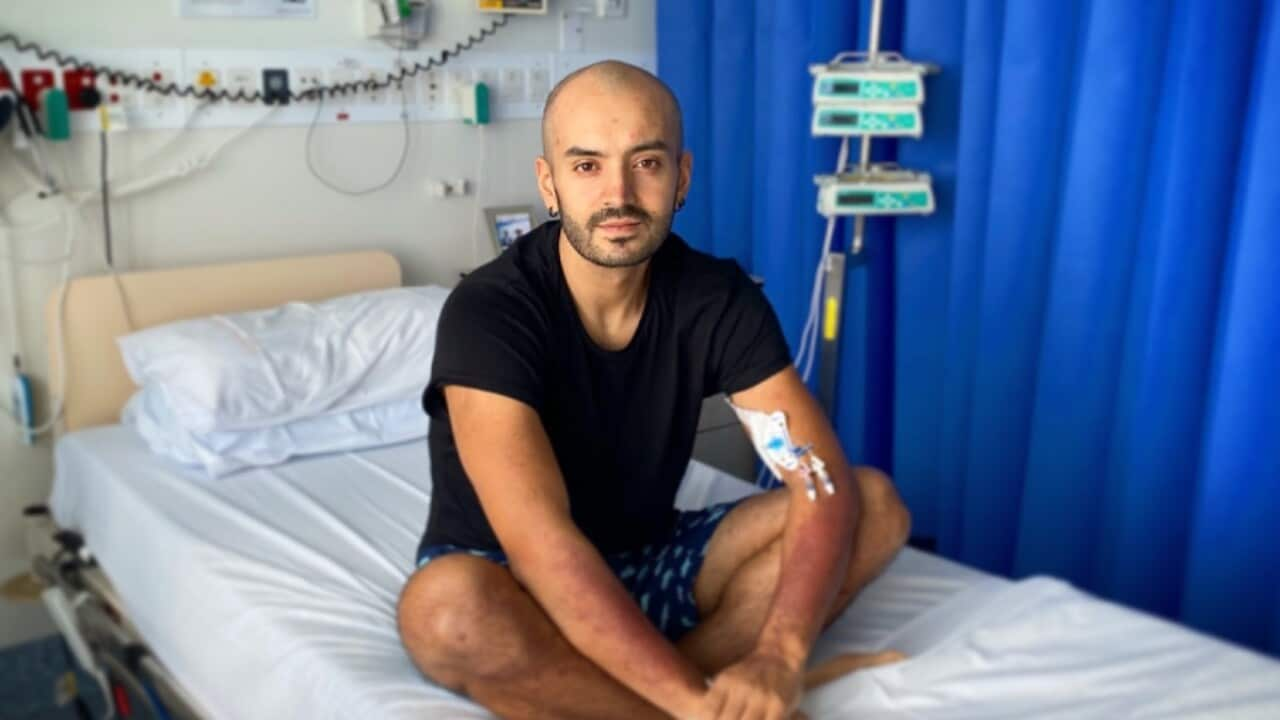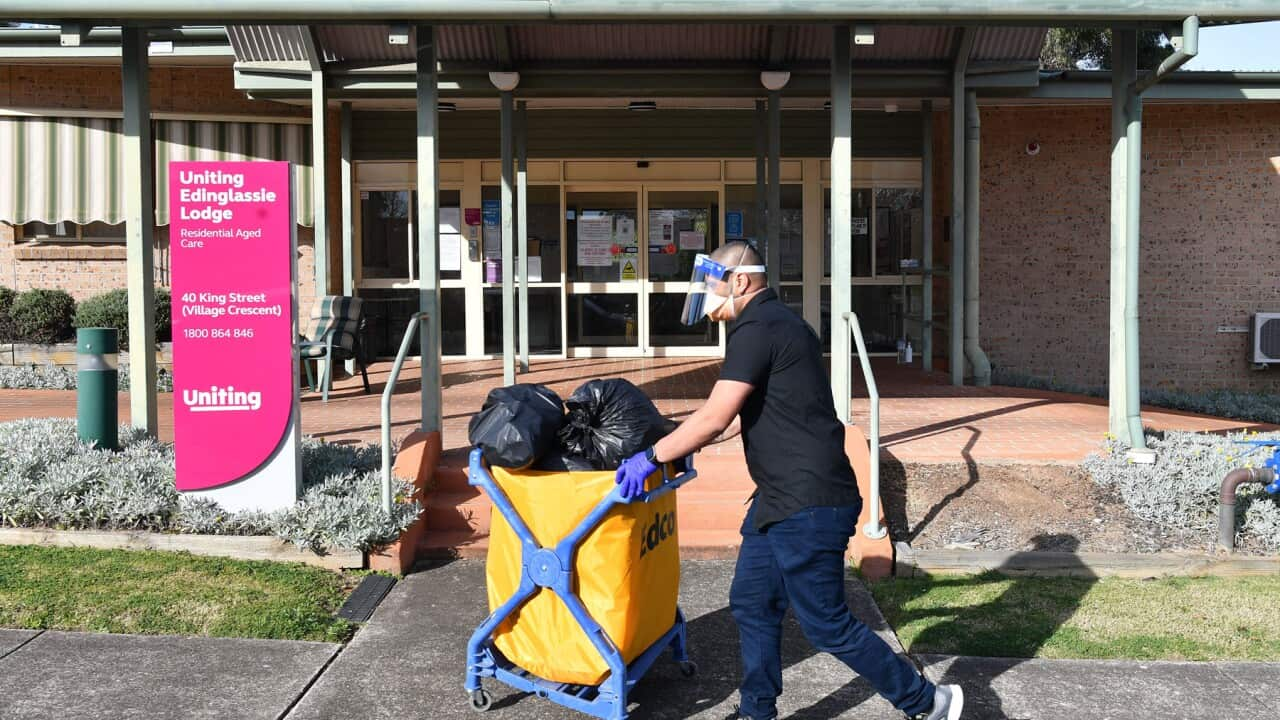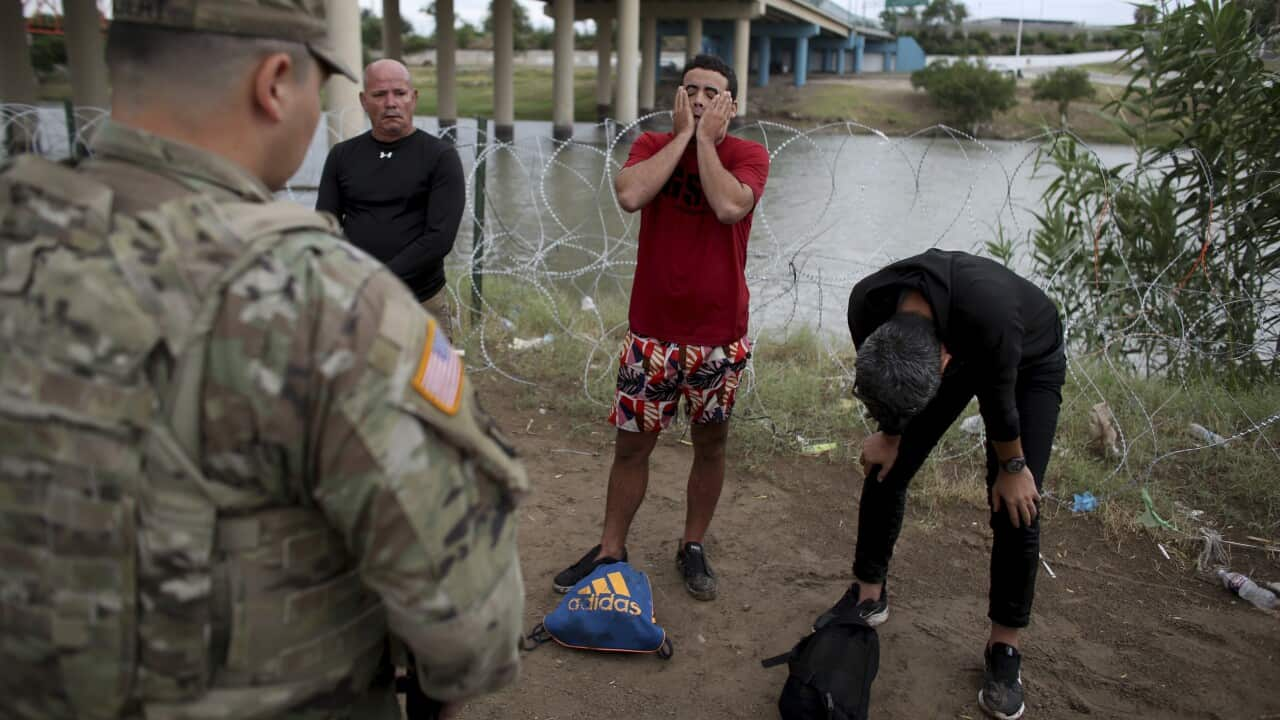The death of Diana Marcela Niño, a Colombian woman who was studying in Australia and was found dead in late May, has touched the hearts of many.
This is not only because of the way in which she took her own life, but also because of the challenging situation that her relatives then faced to repatriate her body.
The compulsory Overseas Student Health Insurance cover the Australian government requires international students to obtain does not cover expenses if they die. Cases like Diana's raise questions on weather the government is exercising appropriate duty of care over insurance cover for migrants coming to Australia.
The Commonwealth Insurance Ombudsman has told SBS Spanish it will consider enforcing a disclaimer regarding death on the mandatory health insurance offered to foreign students.
Highlights:
- Diana Marcela Niño, a Colombian student, took her own life in Melbourne in May 2022.
- Her compulsory health insurance did not cover the repatriation of her body and other death-related expenses.
- Through crowd funding and an emotional appeal from the woman's mother, hundreds donated money to have her body flown home to Bogota.
- SBS Spanish raised the issue with the Department of Health and the Commonwealth Insurance Ombudsman, asking if this was a failure in Australia's duty of care.
'Many angels showed up'
Patricia García, Diana's cousin and one of her closest relatives, says “many angels showed up” for the family.
By “angels”, Ms Garcia refers to the many people who offered to help find Diana when she went missing, and those who supported them financially with repatriation expenses once her body was found.
In Ms Niño’s case, like that of the many other foreigners on temporary visas who die in Australia, relatives face massive out-of-pocket expenses for the return of the bodies of their loved ones.
Immigration lawyer Carlos Lindo says “most of the time, they don't have that money”.
It is very difficult for their relatives: the pain they are suffering due to the death in itself and on top [of that], they have those expenses. In many cases, these people have to travel to Australia to finalise the paperwork and pick up the body, and that is expensive.
A young woman with big dreams
Originally from Bogota, Ms Niño, 38, came to Australia alone to study English. She faced the strict COVID-19 lockdowns in Melbourne by herself, and had told her relatives that she felt that the pandemic had completely “changed her life”.
The nightmare for her relatives began on May 20, when they lost contact with her. The family decided to create a group on Facebook to ask if anyone knew of her whereabouts. On May 31, one of the members of the Facebook group offered to go to a Melbourne police station to ask for information. The family finally got news, but unfortunately, it wasn’t what they were hoping to hear.
On May 31, one of the members of the Facebook group offered to go to a Melbourne police station to ask for information. The family finally got news, but unfortunately, it wasn’t what they were hoping to hear.

Overseas students can face feelings of isolation and loneliness in Australia especially during COVID-19 lockdowns and restrictions. Source: AAP
Victoria Police told SBS Spanish that a 38-year-old woman had been found dead in Flinders Street in Melbourne on May 22 at 12.30am and that the death was not being treated as suspicious, so the case did not concern the Coroner.
Repatriation: a costly nightmare for relatives
SBS Spanish also confirmed that the Colombian Foreign Ministry mediated between the family and the Australian authorities to carry out the relevant procedures and the repatriation of the young woman's body.
Javier Parada, who works at the Colombian Embassy in Canberra’s Consular Section, says they “provide accompaniment to the relatives of the deceased person, by giving them information on funeral services, repatriation services and other issues related to the legislation in each place, since each country has specific requirements and procedures in place”.
“The families get as much information as possible, so that they can make the decisions that are most suited to them.”
However, the support received by family members does not include a financial component, as consulates generally do not cover repatriation expenses when one of their citizens dies abroad. Neither does the Overseas Student Health Cover insurance, the mandatory insurance all foreign students must purchase to be granted a visa to come to Australia.
Neither does the Overseas Student Health Cover insurance, the mandatory insurance all foreign students must purchase to be granted a visa to come to Australia.

Students need to carefully consider the paperwork involved in travelling abroad and take out extra health coverage in the event of death. Source: Cultura RF
Ms Niño was an only child. Her mother, Paulina, is an older woman without the funds to cover the transfer of her daughter’s remains.
GoFundMe campaign raised $27,000 for the transfer of Ms Niño's body
Several friends and people who empathised with the family created a GoFundMe campaign to collect the funds to repatriate the body. To do this, they published an emotional video of Paulina online, pleading for help.
“I don't have the financial means. I wholeheartedly thank the people who want to chip in. Please, I want to see my daughter, even if she is dead,” Paulina said through tears on the video.
She went off to work overseas, to offer me a better quality of life in my old age. Unfortunately, it wasn’t to be, she found death instead.
Almost 750 people donated, and just over $27,000 was raised. Thanks to these funds, Ms Niño's body was laid to rest back in Bogota in early July. In addition, the Colombian Embassy assisted relatives with the necessary paperwork negating the need for them to travel to Australia to accompany her body home.
However, some initially doubted the veracity of the campaign and questioned why this money was being collected. Others also wondered whether there was insurance to cover such expenses.
The answer is no: the health insurance known as “Overseas Student Health Cover” that all international students must purchase as part of their visa requirements when they come to Australia, does not cover expenses in the case of death, let alone repatriation.
In short, the insurance required by the Australian immigration authorities for foreign students only covers their health issues in life. If the person wants to be covered in the event of death, they must pay for additional insurance, which they must purchase voluntarily.
In fact, the current , state that: “Insurers have the flexibility to provide additional health insurance products above the minimum services set out in the Deed. This enables Overseas Students to select an appropriate level of extended coverage, according to their requirements.” However, “the decision whether (or not) to offer other extra services, such as repatriation cover, is a commercial decision for each Insurer”.
Should all OSHC policies include death coverage?
SBS Spanish asked the Department of Health and Aged Care if it considered that the current mandatory cover of the OSHC should include expenses in the case of death, or at least add a clear explanation stating that death cover was a voluntary 'add in' option, given that foreign students generally know little to nothing about local laws and the insurance industry in Australia.
The Department responded that the scope of coverage and premiums for OSHC was intended to guarantee that the cost of health insurance didn’t disincentivise prospective international students from coming to Australia to study, “and to ensure that they have access to affordable medical and hospital treatment whilst they are in the country”. And, in order to make it affordable, it’s focused only on “health and medical treatment, ambulance services, and pharmaceutical items”.
The Department of Health spokesperson explained that "services such as medical repatriation is appropriately available as an option under the additional coverage OSHC products", and added: "Repatriation is also available under other types of insurance, such as travel insurance".
The Department also claims that the Deed and explanatory material for consumers outlining the scope of coverage for OSHC is publicly available on the Department’s website.
“The details of the different products and additional coverage offered by insurers are also publicly available.”
But the question is: should international students receive better guidance when they are acquiring their OSHC?
Immigration lawyer Carlos Lindo says migration agents seldom explain the limitations or conditions of this health insurance to prospective international students looking to come to Australia.
He believes agents should 'go the extra mile' as part of their duty of care and recommend students purchase life insurance to cover them in the event of death. The Commonwealth Insurance Ombudsman told SBS Spanish: “OSHC providers should explain what benefits are provided by their policies and warn of any important exclusions.”
The Commonwealth Insurance Ombudsman told SBS Spanish: “OSHC providers should explain what benefits are provided by their policies and warn of any important exclusions.”

Diana Marcela Niño was missing for six days before police found her body in a Flinders Street apartment in Melbourne. Source: AAP
The Insurance Ombudsman added that even though they "have not received any complaints about this issue to date", that they "will consider the information that is currently available to students and whether the addition of a new disclaimer about what happens in the event of the death of a student would assist".
Meanwhile, Mr Lindo recommends students planning to come to Australia obtain this insurance cover privately and pay extra.
But also, they should ask the companies that offer them the insurance they would also like to be covered in the event of a death.
“Legislation should change the insurance requirement [for foreign students], so that it also covers life insurance or at least covers the expenses if a death occurs in Australia, which is something that the family normally has to pay," Mr Lindo says.
SBS Spanish sought comment from the Department of Home Affairs, that oversees the Department of Immigration, but they didn’t answer the questions put to them regarding this issue.
An additional option for foreigners is to purchase travel insurance, as some policies offer death cover and repatriation expenses, as well as emergency evacuation in cases of serious illnesses.
However, it’s also important to note the full terms and conditions of the insurance you’re buying, as most will not cover death by suicide or other activities deemed to have contributed to a death.
Another recommendation made by Mr Lindo is to always seek advice from superannuation or retirement funds, as many normally include coverage of expenses in the event of death.
And for those who are already in Australia, it is important to share all of this information with their relatives in their homeland, so that, if necessary, they are aware of which companies to contact.
Mr Parada advises people to register at the consulate of their country of origin and keep their information up to date, to facilitate contact with their relatives in the event of emergency.
“When completing a consular registration, the person enters their basic contact information so we can establish a direct line of communication, and also inform us of emergency contacts they wish to register, so that we can offer first-hand help in case of an incident,” Mr Parada says.
The importance of mental health when you are away from home
The reasons why Ms Niño took her own life will remain a mystery to her relatives.
“The Marcela I knew was a dreamy girl, a pretty girl… you can tell me, 'she killed herself' and I know this was the case, but there are many questions for us, the family, that will be left unanswered,” Ms Garcia says.
According to mental health expert Felix Gomez, 10 to 12 people per 100,000 take their own lives each year in Australia. He says the triggers for suicide are multiple and very layered.
“In many cases, suicide is the final expression of the collapse of the psyche, and I must say that it has to do with elements that are not only individual, biological or psychological, but also with specific conditions or certain socioeconomic elements,” Mr Gomez explains.
However, there are common factors that affect all migrants when they were away from home, and that, in some cases, could lead to depression, he says.
Social isolation is a problem which is more likely to impact migrant and refugees groups that can be particularly vulnerable.
“Also, if people migrate or come to Australia alone, this could be a critical element for a person who is going through depression or an anxiety disorder," Mr Gomez adds. Mr Gomez believes that many foreign students, and especially Latin Americans, have strong family ties, a common trait shared by many African, Mediterranean, Middle Eastern and American cultures, in which the family also includes friends and even neighbours.
Mr Gomez believes that many foreign students, and especially Latin Americans, have strong family ties, a common trait shared by many African, Mediterranean, Middle Eastern and American cultures, in which the family also includes friends and even neighbours.

Exercising as well as getting a pet are key ways to cope with depression and anxiety. Source: Getty
The mental health expert explains that when they arrive, migrants find that Australian society held values more oriented towards individualism, and families tended to be made up of just parents, their children or siblings, and in some cases, grandparents.
“That [situation] can clash with a person’s set of beliefs and if that person has been going through a process of, let’s say, depression or untreated depression, anxiety disorder, or they come with post-traumatic stress, that may intensify with the migration process,” Mr Gomez says.
He believes the pandemic has had a devastating effect on the mental health of many migrants, as for most foreigners, the pandemic resulted in them feeling trapped in Australia, unable to travel to see their relatives.
This, compounded by the isolation and loneliness of the lockdowns, scarred many people.
Figures indicate that the phenomena of depression and anxiety in Australia had increased by 10 per cent after the pandemic.
This may have been the case for Ms Niño, according to her relatives.
"She told me, ‘the pandemic changed my life a lot, work has been difficult for me’. Her quality of life was also affected. What I did notice was that she began to isolate and communication was no longer as fluid as before,” Ms Garcia recalls.
Prevention over regret
Mr Gomez says it is crucial to detect and act upon the early warning signs of depression. These red flags include a constant feeling of sadness, lack of motivation, loss of pleasure in carrying out daily activities (including disregard for personal hygiene) and social isolation.
"What I suggest to people going through this is to avoid isolation; they need to communicate," he said.
Mr Gomez recommends reaching out to community centres, where social workers are on hand to provide free support for migrants.

Free help is available for those suffering mental health issues. Source: Getty Images
"Some health insurance funds also offer mental health cover, so it is important to explore this option with your insurance company to receive psychological or psychiatric support if needed," the expert adds.
By way of some final advice, he says there are simple actions a person could take if they are feeling down, such as going for walks, exercising regularly to activate the body, or getting a pet, which could alleviate feelings of loneliness.
If you are going through a situation of depression or have suicidal thoughts, contact on 13 11 14, 24 hours a day, seven days a week.
There is also the Australian services office in all languages on 131 202, or you can consult
You can also visit a complete list of online sites that provide help to prevent suicide in Australia through this link.







